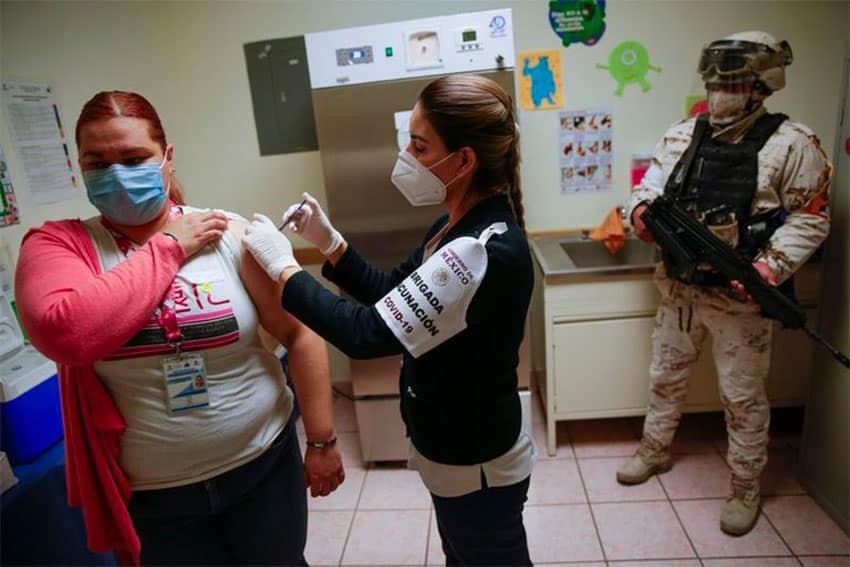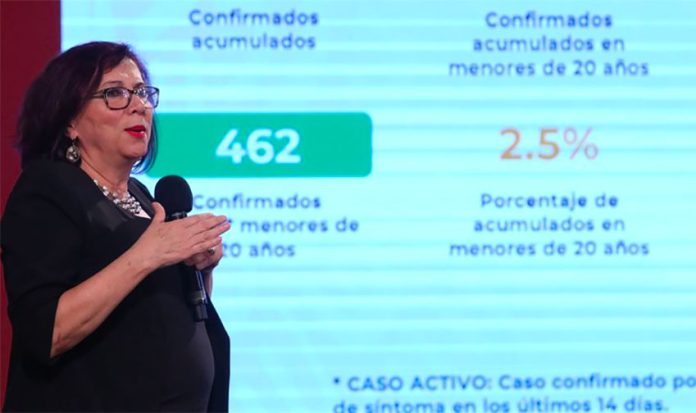The federal government’s vaccination chief has resigned just as Mexico is ramping up immunization against Covid-19 but a health official says her departure won’t affect the national program to inoculate citizens against the virus.
There were some media reports that Miriam Veras Godoy, the now former director of the National Center for Child and Adolescent Health – which manages Mexico’s broad vaccination program –stepped down because she didn’t agree with aspects of the Covid-19 vaccination plan presented last month.
But federal health promotion chief Ricardo Cortés said Sunday that the reasons behind her resignation were purely personal.
“She took the decision without being in disagreement with anything,” he said.
While Veras was involved in the planning and administration of the Covid-19 vaccination program that is currently underway, her departure won’t leave a “hole” in it, Cortés said.
“We will continue moving forward with an operation that has great challenges [but] whose objectives we are meeting,” he said.
Cortés stressed that the Covid-19 vaccination program is different from programs to administer other vaccines because the entire federal government, rather than just the Health Ministry, is involved in the efforts to immunize citizens against the infectious disease that has claimed more than 140,000 lives in Mexico.
He said Deputy Health Minister Hugo López-Gatell, the government’s coronavirus point man, and Health Minister Jorge Alcocer will choose a replacement for Veras in the coming days.
According to data presented at the Health Ministry’s Sunday night coronavirus press briefing, almost 469,000 doses of the Pfizer/BioNTech vaccine have been administered in Mexico since the program began on December 24.
The program is still in stage 1, meaning that only frontline health workers are currently eligible for the vaccine, but there were reports over the weekend that federal government employees responsible for conducting censuses to determine eligibility for government social programs had been inoculated in parts of Jalisco and Guanajuato.
The news precipitated an outpouring of anger on social media because some health workers in those states are still waiting for a first shot of the Pfizer vaccine.

Although the vaccination plan clearly stipulates that health workers will be prioritized, López-Gatell asserted Saturday that the so-called “servants of the nation” had not jumped the queue.
He noted that they are part of brigades of health workers, military personnel and volunteers that have been tasked with distributing and administering Covid-19 vaccines and claimed that made them eligible for early inoculation.
“The national servants … are in fact coordinating the brigades … and it’s specified in the vaccination plan that the members of the brigade will also be vaccinated. [The early vaccination of national servants] is not an anomaly, it’s not an abuse – it’s part of what is planned,” López-Gatell said.
With only a very limited number of vaccine doses currently in the country at a time when Covid-19 is claiming more lives than any other since the start of the pandemic, there is no end in sight to Mexico’s coronavirus crisis.
The government did significantly increase the number of vaccines being administered on a daily basis after receiving a shipment of almost 440,000 doses of the Pfizer vaccine last Tuesday but with a population of almost 130 million, Mexico has a long way to go to reach the level of protection required to bring the pandemic to an end.
A potential threat to the government’s efforts to increase the pace of immunization is that Mexico has agreed to a United Nations proposal to delay some of its shipments of the Pfizer vaccine so that doses can get to poorer countries more quickly.
President López Obrador said Sunday that the UN had asked the United States pharmaceutical company to reduce the number of doses it is sending to countries with which it has contracts – Mexico has an agreement to purchase 34.4 million doses of the two-shot vaccine – so that it can receive more and distribute them to poor countries that have been unable to secure access on their own.
“We agreed with that,” the president said, adding that the all of the doses pledged to Mexico will still eventually arrive.
Although the Pfizer vaccine is the only vaccine currently being used in Mexico, López Obrador claimed that the national vaccination program won’t be affected by the delay.
“We’ve already made deals so that the Cansino vaccine from China begins to arrive as well as a vaccine from a Russian laboratory [the Sputnik V],” the president said, noting that the government also has an agreement to purchase 77.4 million doses of the AstraZeneca/Oxford University vaccine.
“We’re going to have enough vaccines,” López Obrador said before criticizing countries that are stockpiling large quantities.
Source: Infobae (sp), Expansión Política (sp), Proceso (sp)
